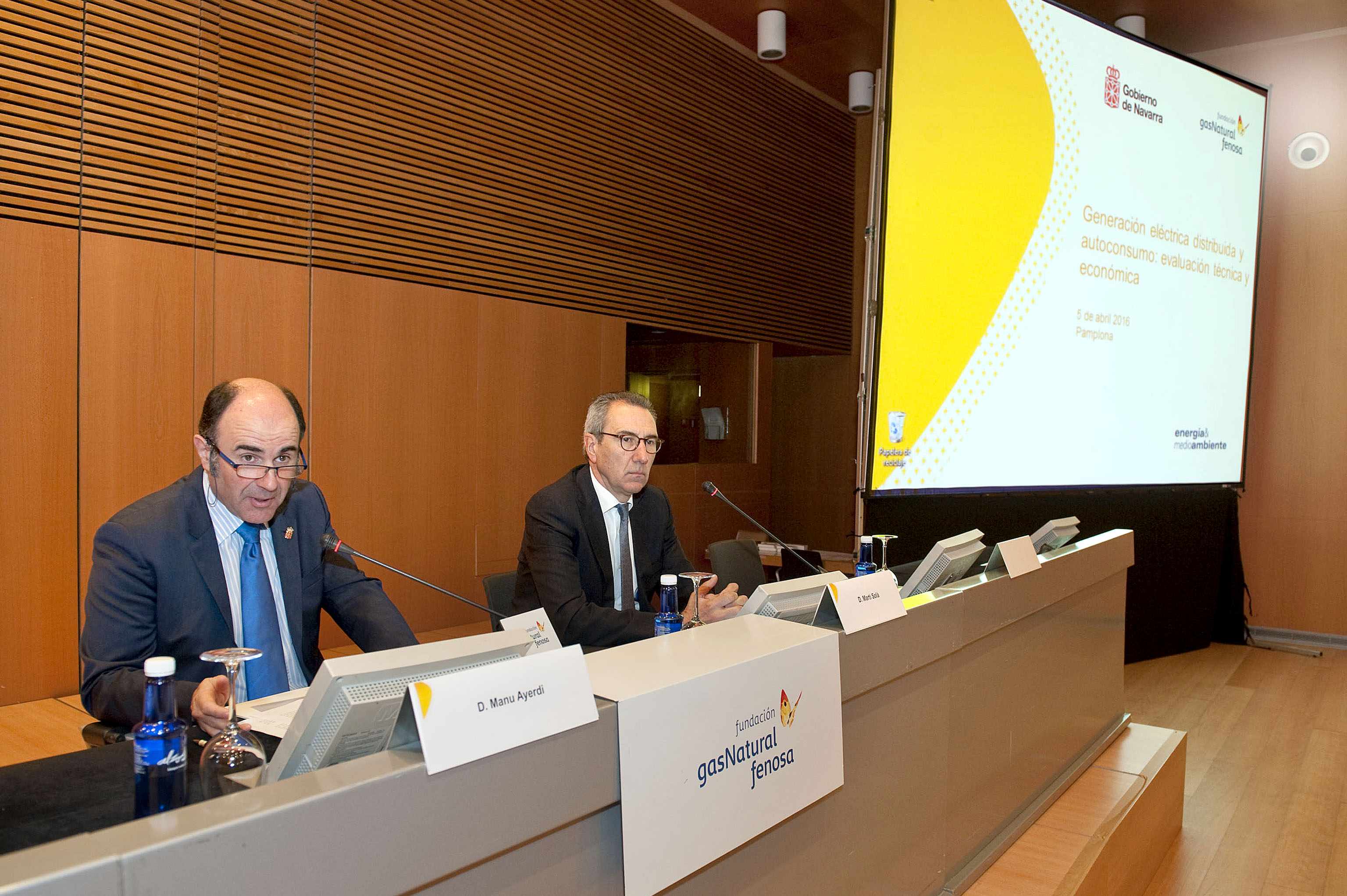Gas Natural Fenosa Foundation analyses the potential of distributed electricity generation and self-consumption in Pamplona
At a seminar organised in Pamplona earlier today in collaboration with the Economic Development Council of the Provincial Government of Navarre, various experts analysed the technological, economic and regulatory challenges of self-generation and self-consumption in Spain.

Earlier today, the Vice-President and Councillor for Economic Development of the Provincial Government of Navarre, Manu Ayerdi, and the Managing Director of the Gas Natural Fenosa Foundation, Martí Solà, officially opened the seminar entitled ‘Distributed Electricity Generation and Self-consumption: a technical and economic assessment’. The event was attended by over 130 professionals.
During the seminar, various experts assessed the costs of electricity generation, the development of solar photovoltaic technology and the opportunities for combining this technology with natural gas. Furthermore, discussion took place on regulatory issues for a balanced development of self-generation and self-consumption in Spain, and the current situation in other European countries.
The representative from the Institute of Technology Research at the Higher School of Engineering (ICAI) of the Pontificia Comillas University, Rafael Cossent, explained basic concepts concerning the electricity tariff in Spain, stating that the National Markets and Competition Commission (CNMC) estimates for 2016 that the access costs of the Spanish electricity system will amount to over 17.7 billion euros, of which the cost corresponding to transport and distribution networks represents close on 40%, another 40% corresponds to specific remuneration of renewable energies, cogeneration and waste, 15% to the payment of annual tariff deficit instalments and the remaining 5% to other costs (extra-peninsular compensations, interruptibility services, capacity payments, etc.).
The Head of Training and Technical Support at BAXI, Alberto Jiménez, gave a technological assessment of electricity generation distributed with natural gas, discussed the use of micro-generation machines for the simultaneous production of electricity and thermal energy, and showed how the use of this technology in heating installations and hot water production installations can reduce primary and non-renewable energy consumption by over 25% and CO2 emissions by over 20%.
The Managing Director of the Catalonia Institute for Energy Research (IREC), Juan Ramón Morante, assessed the current situation in terms of small-scale photovoltaic technology, highlighting the significant reduction in its cost over recent years to currently stand below 6c€/KWh. From an economic point of view, Juan Ramón Morante explained which aspects have a decisive impact on costs and how to calculate the pre-tax cost of photovoltaic generation and the related electricity storage associated with solar self-consumption. To this end, he recommended changing the electricity price structure in Spain, including the costs related to electricity generation, transport and distribution, and other costs that are not directly tied to supply (subsidies and taxes).
The Electricity Regulation Director of GAS NATURAL FENOSA, Javier Latorre, presented the main regulatory aspects of Royal Decree 900/2015 on self-consumption and explained that the power company offers free advice to companies on their options in terms of benefiting from photovoltaic self-consumption. Furthermore, he proposed various regulatory improvements for better development of energy self-consumption in Spain, stressing the need for balance between the self-consumption installations connected to the electricity system and the financing of system costs and services in order to guarantee the technical and economic sustainability of this system as a whole.
The Energy Director of PricewaterhouseCoopers (PWC), Óscar Barrero, presented a recent study conducted by PwC Spain that attempts to build a model on the theoretical potential for self-consumption based on the current regulatory framework. He explained that this model only considers economic criteria and, under these circumstances, the foreseeable penetration of self-consumption could reach 4GW, where a little over half would be produced in the residential segment and in areas with the most sunlight.
Finally, the Director of NERA, Óscar Arnedillo, analysed the strong interest generated by self-consumption among Spanish consumers and assessed the economic costs of installing self-consumption equipment.
Gas Natural Fenosa Foundation
The Gas Natural Fenosa Foundation, founded in 1992, works to promote information and training and raise social awareness of improvements in energy efficiency and technological innovation in the field of energy while respecting and protecting the environment. It promotes cultural activities through its Gas Museum that are aimed at preserving and publicising the sector's historical and cultural heritage. It also has a programme to support exports for small and medium-sized enterprises. Its international activities are carried out in Algeria, Argentina, Brazil, Colombia, Costa Rica, Mexico, Morocco, Italy, Moldova and South Africa.
Pamplona, 05 April 2016.
Share